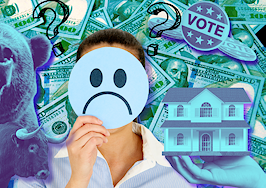At Inman Connect Las Vegas, July 30-Aug. 1 2024, the noise and misinformation will be banished, all your big questions will be answered, and the new business opportunities that await will be revealed. Join us.
United States property investors are putting the pedal to the metal and feeling optimistic despite a turbulent housing market, according to a pair of reports.
The share of homes purchased by investors reached a new high in the fourth quarter of 2023, and investor sentiment remains relatively high heading into the spring housing market.
In October, November and December, the share of single-family homes purchased by investors was 28 percent, 27.3 percent and 28.7 percent respectively, according to a report released this week by CoreLogic — beating out the previous all-time high share of 28.3 percent recorded in February 2022. The share of purchases made by investors could exceed 30 percent in 2024, the report posits.
The purchases recorded by investors in the fourth quarter of between 79,000 and 80,000 purchases per month are similar to the figures recorded by investors pre-pandemic before an investing surge in 2021. That stands in contrast to purchases made by owner-occupants, who are purchasing about 100,000 fewer homes per month than they were prior to 2022. This demonstrates investors’ resilience in the face of high interest rates and low inventory.
That’s perhaps why the investor sentiment report from RCN Capital and CJ Patrick Company found that real estate investor sentiment remains positive overall or, more specifically, cautiously optimistic. When queried how the current investing landscape is compared to a year ago, 16 percent of respondents called it “much better,” 20 percent said it was “better,” while 36 percent said it was “about the same.” 19 percent answered that conditions were “worse” while 8 percent answered that they were “much worse.”
The report’s authors noted that negative sentiment was at an all-time low for the survey’s history, while positive or neutral sentiment sat at an all-time high.
More than 41 percent of investors said they expected conditions to be “better” or “much better” in six months compared to now.
Recording a decline during the fourth quarter, however, were both home flippers and iBuyers. Only 12 percent of investors who purchased a home in March 2023 resold it by the end of December, according to the report. Home flipping tends to slow down when appreciation is slow and interest rates are high, as renting a property out becomes a more attractive business model.
This is seen in the buying habits of iBuyers as well. Throughout 2023, iBuyers only purchased about 1,000 homes per month — a huge drop from 2021 and 2022 when they purchased between 5,000 and 9,000 homes per month at certain points.
That slowdown could arguably be attributed to iBuyers over-aggresively spending on home purchases during the pandemic housing market, only to be stuck with an excess of inventory and less than satisfactory appreciation in some markets once mortgage rates began to increase.













